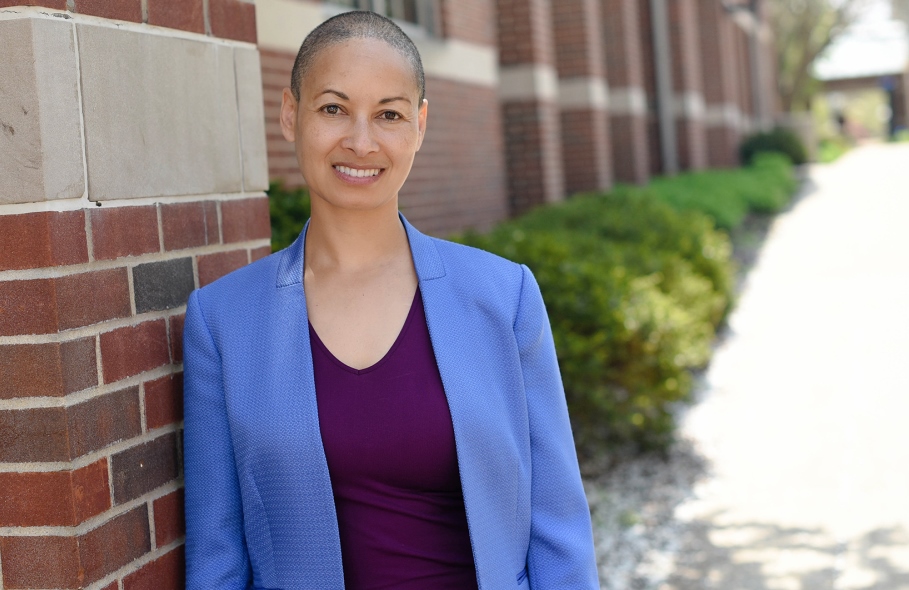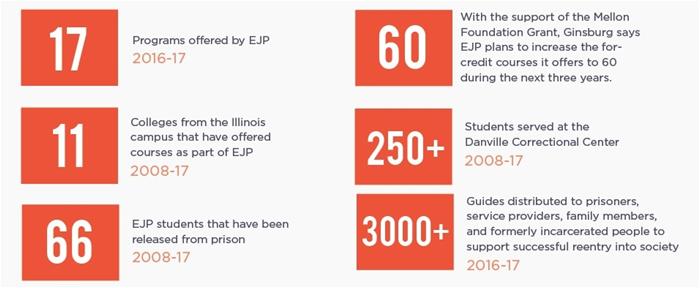Education Justice Project receives $1 million grant from Andrew W. Mellon Foundation
by the College of Education / Oct 17, 2017

Rebecca Ginsburg, director of Education Justice Project
Funding to go toward men’s college-in-prison program, non-credit course for incarcerated women, and new speaker series
Since 2006 the mission of the Education Justice Project (EJP) has been to build a comprehensive college-in-prison program that demonstrates the positive impacts of higher education on incarcerated people and their families, as well as the communities they come from. The academic program consists of for-credit courses, educational workshops, a mindfulness discussion group, reading groups, and other programmatic activities.
In 2017 EJP received a three-year grant in the amount of $1 million from the Andrew W. Mellon Foundation. The funding will go toward the expansion and development of the men’s college-in-prison program, located approximately 35 miles from Urbana-Champaign at the medium-security Danville Correctional Center.
The money will also go toward a series of not-for-credit course offerings for a nearby minimum-security women’s prison and the publication of an edited volume about pedagogy in the prison classroom. Additionally, it will fund a new speaker series co-hosted by EJP and the Illinois Program for Research in the Humanities. The speaker series will bring out-of-state authors and artists to the prison and campus twice a year.
The generous support of the Mellon Foundation promises to allow EJP, which has already served almost 250 individual students at the prison, to impact the lives of many more individuals." - Rebecca Ginsburg
According to EJP Director Rebecca Ginsburg, one of the most important aspects of the grant is its evaluation piece.
“The generous support of the Mellon Foundation promises to allow EJP, which has already served almost 250 individual students at the prison, to impact the lives of many more individuals," Ginsburg said. “There is general agreement that college-in-prison programs make a difference in the lives of the people who participate in them,” Ginsburg said. “However, as a field, we haven’t been thoughtful about nailing down precisely what the outcomes of such programming can be, or of identifying the mechanisms by which college-in-prison makes a difference. Is it through imparting skills? Developing cultural capital? Inculcating a particular set of habits? We’re delighted to be able to spend a year investigating such questions deeply, thanks to the Mellon Foundation.”
Nicole Robinson of Nnr Evaluation, Planning & Research in Wisconsin will head the evaluation effort, with internal support from Jennifer Greene, a professor in the Department of Educational Psychology. The yearlong evaluation process will be capped off with a national symposium on evaluating higher education-in-prison programs, hosted by EJP and funded by the Mellon Foundation.
“The generous support of the Mellon Foundation promises to allow EJP, which has already served almost 250 individual students at the prison, to impact the lives of many more individuals,” Ginsburg said.
Read more about this news from the Illinois News Bureau.
Johnny Page: A Positive Path Forward
The Education Justice Project allowed 44-year-old Johnny Page to earn more than 30 credit hours from the University of Illinois. When he was released from the Danville Correctional Facility in 2014, he used those hours to transfer to Governors State University and earn an undergraduate degree. Page is now a graduate student at Northeastern Illinois University and has an interest in the social cycle of community psychology. He said EJP’s small, discussion-oriented classes are based on research and community, courses that are on par with the learning students get in graduate school. “I feel like I’m right where I’m supposed to be,” he said.
Page was one of EJP’s first students and helped establish the organization’s Chicago/Community Anti-Violence Education program (C.A.V.E.) in 2010. With the help of a fellow EJP graduate and faculty member, Page started a C.A.V.E. program in Chicago after his release from the Danville facility. Funding for the program has ended, but he’s hopeful it will be revived in the coming months.He also hopes EJP can be expanded “throughout the system” so that other incarcerated individuals can experience the enriching learning environment he did. Page said he appreciates how EJP reaches out to its graduates after they are no longer incarcerated, keeping alumni on a forward-thinking path. “The program is continuously reaching out, seeing where you’re at, seeing how they can help you, and continuing your education journey,” he said.
